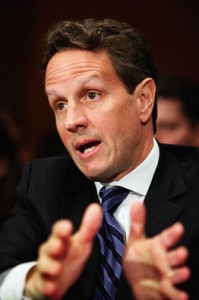It is not often that we agree with Treasury Secretary Timothy Geithner, but he was exactly right in his remarks on the global energy situation. After meeting with German Finance Minister Wolfgang Schaeuble, Geithner sought to reassure the public by saying that “major producers of oil” and the “major developed economies” had adequate reserves to counteract any supply disruptions from the unrest in Libya.

We agree wholeheartedly. Of course, Geithner had in mind the other OPEC nations, whereas the “major producer of oil” we mean is the United States of America—the world’s third largest oil producer.
Geithner’s Admits That Boosting Oil Output Would Calm Fears
An AP story gives the full context of Geithner’s remarks
Seeking to ease global energy concerns, Treasury Secretary Timothy Geithner declared Tuesday he was confident major oil producers can counter any shortfall in supplies resulting from the crisis in Libya.
Oil prices have spiked higher recently as a result of the Libyan uprising and fears of unrest elsewhere in the region. They retreated somewhat on Tuesday as OPEC ministers discussed whether to ramp up production but remain near 30-month highs.
“It’s important to recognize that the major producers of oil and the major developed economies do have substantial reserves, resources available that they could mobilize if necessary to respond to any supply disruption,” Geithner said after talks with German Finance Minister Wolfgang Schaeuble in Berlin.
We at IER are glad to see that the Treasury Secretary understands the way to “ease global energy concerns” is to reassure the public that more oil is available. (Based on the actions of some of Mr. Geithner’s fellow cabinet secretaries, we were beginning to wonder.) That’s the message we’ve been broadcasting for quite some time now: the way to boost economic output, provide more affordable energy, and ease the government’s fiscal problem is to unshackle the producers of domestic energy.
Offsetting Libya’s Interruption
Of course we are being facetious in our discussion; when he said “major oil producers,” Geithner had in mind OPEC nations.
Although Americans have been trained not to think so, the United States is a major oil producer—the third-largest in the world, behind Russia and Saudi Arabia:
[table id=37 /]
Source: Energy Information Administration
Incidentally, Libya isn’t even among the top-15 oil producers. The reason it is of such concern to world markets is that (in 2009) it was the 12th largest exporter of oil. These exports have now come to a virtual halt because international banks are declining dollar-denominated oil transactions with Libya, on account of U.S. sanctions.
It is ironic that Americans are fretting over the disruption in Libya’s oil exports—about 1.6 million barrels per day—when there are enormous untapped resources at home. The ANWR 1002 area alone could generate an estimated one million barrels per day in additional U.S. output.
Affordable Energy Means a Stronger Economy
In addition to reassuring the public that more oil would be forthcoming, Geithner also said that “even in the face of these uncertainties,” there are “encouraging signs of gradually strengthening recovery” in the world’s large economies. Whether or not his rosy assessment is correct, Geithner is right to note that uncertainties in energy availability are a drag on economic growth.
In a similar vein, on Monday Atlanta Fed president Dennis Lockhart said that rising oil prices might require “QE3,” in other words a third round of asset purchases to bolster the struggling recovery. According to a CNNMoney story:
Appearing at the National Association of Business Economics in Arlington, Va., Lockhart said that while he doesn’t think additional purchases are currently warranted, more stimulus could be needed if oil prices continue to climb.
“If [the rising price of oil] plays through to the broad economy in a way that portends a recession, I would take a position we would respond with more accommodation,” Lockhart said at the conference.
Though he doesn’t think current oil prices around $106 a barrel are a problem, he said the evidence is clear that oil spikes can bring about a recession.
“I think at the $120 range … it’s a manageable level,” he said. “Around $150 it becomes a much more serious concern.”
Critics of the Fed’s loose-money policies heaped scorn on Lockhart’s remarks, since the earlier rounds of “quantitative easing” are arguably a main driver of rising commodity prices. Furthermore, one can quibble with Lockhart’s dismissal of $106 crude oil as not “a problem,” but at least he recognizes that $150 oil would be a “much more serious concern.” At this point, we’ll take what we can get, because Secretary of the Interior Ken Salazar didn’t agree back when he was a senator from Colorado.
As House Speaker John Boehner recently recalled, back in 2008 Salazar got into a verbal joust on the Senate floor with then-Senate Minority Leader Mitch McConnell. In the face of soaring gasoline prices, McConnell had offered a measure that would open up offshore drilling in the event that prices broke $4.50 per gallon. Salazar objected, and McConnell kept raising the threshold, eventually reaching $10 per gallon. Still, Salazar said he would not support the further development of domestic oil and natural gas. Interesting readers can watch the video:
Conclusion
Despite himself, Treasury Secretary Geithner agrees with us that plentiful and affordable oil supplies are crucial for the health of the global economy. We just hope he can convince his fellow Secretary Ken Salazar.



